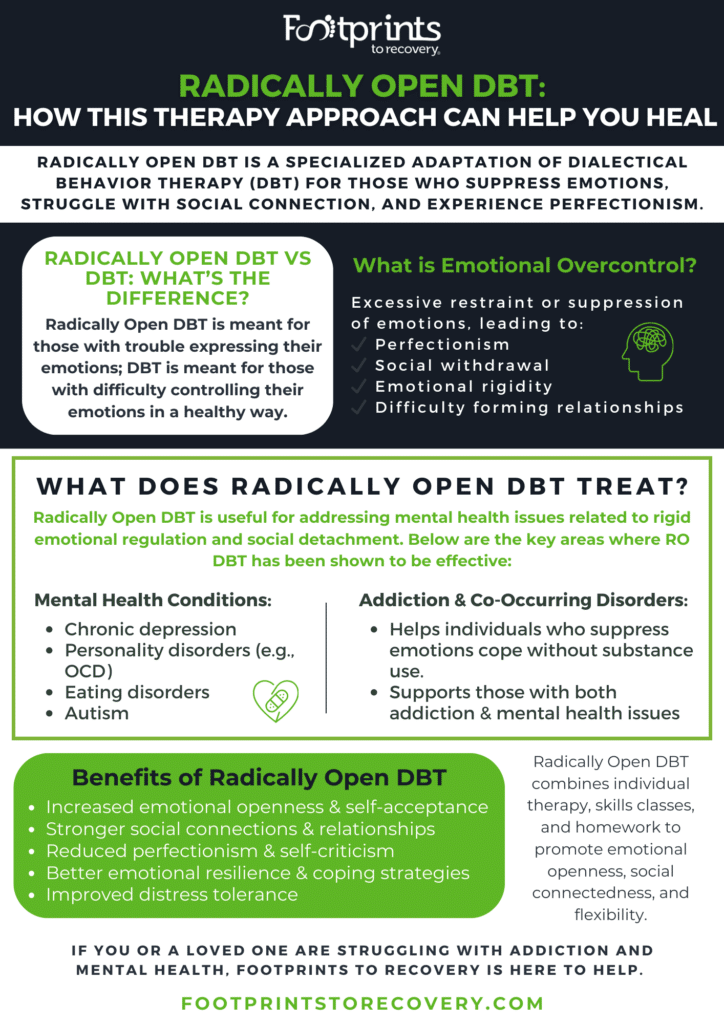Radically Open DBT is an adaptation of traditional DBT, short for Dialectical Behavior Therapy. Where DBT focuses on emotional regulation, radically open DBT inverts things by encouraging people to stop suppressing or excessively controlling their emotions. It’s tailored for individuals who tend to suppress or excessively control their emotions, leading to social isolation, perfectionism, and difficulty expressing vulnerability.
The roots of Radically Open DBT trace back to the research of Dr. Thomas Lynch in the early 2000’s. Lynch wanted to develop a form of therapy for people who were emotionally inhibited. Since its creation, Radically Open DBT has been used to treat individuals struggling with emotional overcontrol and is considered an research-based treatment for specific disorders that don’t respond as well to traditional DBT.
What Is Dialectical Behavior Therapy?
Dialectical Behavior Therapy (DBT) is a type of cognitive-behavioral therapy (CBT) that was developed by psychologist Marsha Linehan in the late 1980s. It was initially designed to treat individuals with borderline personality disorder (BPD), particularly those who exhibit intense emotional dysregulation and engage in self-destructive behaviors such as self-harm and suicidal tendencies.
Since its development, DBT has been adapted for a variety of mental health treatment issues, including mood disorders, eating disorders, post-traumatic stress disorder (PTSD), and dual diagnosis treatment of substance use disorders.
Radically Open DBT vs DBT: What’s the Difference?
The main difference between Radically Open DBT and traditional DBT is who each therapy is meant for. Radically Open DBT is meant for those with trouble expressing their emotions; DBT is meant for those with difficulty controlling their emotions in a healthy way.
What Is Emotional Overcontrol?
Emotional overcontrol refers to a pattern of excessive restraint or suppression of one’s emotions, leading to difficulties in experiencing, expressing, and regulating feelings. People who experience emotional overcontrol tend to avoid or hide their emotions rather than allow themselves to fully experience or express them. This can result in emotional rigidity, social withdrawal, perfectionism, and difficulty forming or maintaining close relationships.
According to a scientific study, emotional overcontrol is one risk factor for personality disorders.
What Does Radically Open DBT Treat?
Radically Open DBT is useful for addressing mental health issues related to rigid emotional regulation and social detachment. Below are the key areas where RO DBT has been shown to be effective:
Radically Open DBT for Addiction
RO DBT can be beneficial for individuals struggling with substance use disorders, especially when emotional overcontrol is a contributing factor.
However, individuals who engage in emotional suppression may find it difficult to express vulnerability or seek support, which can worsen their addiction issues. It’s also worth noting that addictions are generally linked more to emotional dysregulation than overcontrol.
Radically Open DBT for Mental Health
According to a systematic review, Radically Open DBT is effective for treating chronic depression, various personality disorders like OCD, and eating disorders. It can also help treat autism.
Radically Open DBT for Co-Occurring Disorders
Co-occurring disorders (also called dual diagnoses) refer to the presence of both a mental health condition and a substance use disorder. RO DBT can be especially effective for individuals who have both addiction and mental health disorders, as it helps treat both emotional overcontrol and the behavioral patterns that contribute to both conditions.
What are the Core Principles of Radically Open DBT?
The core principles of Radically Open Dialectical Behavior Therapy (RO DBT) are designed to address emotional overcontrol and help individuals achieve greater emotional openness, social connection, and flexibility.
Here’s a breakdown of the key principles:
Radical Openness
Radical Openness is obviously the central concept of this form of DBT. It encourages individuals to embrace vulnerability and be open to experiencing and expressing their emotions, even those that might be uncomfortable or difficult. This principle helps individuals confront the fear of vulnerability and release the urge to maintain rigid control over their emotions and behaviors.
Self-Enquiry
Self-enquiry in Radical Openness DBT involves cultivating a habit of self-reflection, self-awareness, and non-judgmental exploration of one’s emotional experiences. Through self-inquiry, individuals are encouraged to examine their emotional patterns, thoughts, and behaviors in a mindful and inquisitive manner.
Social Connectedness
One of the major consequences of emotional overcontrol is social isolation. People who can’t connect with others emotionally will feel almost invisible to them like people don’t really “see” them.
Thus, improving social connectedness is a major goal of Radically Open DBT. By learning to interpret and respond to social signals, individuals are better able to engage in positive, supportive interactions and develop a sense of belonging.
Mindfulness Skills
Mindfulness is another core component of RO DBT. Mindfulness skills are used to help individuals become aware of their present-moment experiences—emotions, thoughts, sensations, and actions—without judgment or avoidance. Mindfulness in RO DBT focuses on being more open and accepting of one’s emotional and social experiences as they arise.

"*" indicates required fields
Fill out the form below and one of our admissions team members will reach out to you:
"*" indicates required fields
What Is Radically Open DBT Like?
Radically Open Dialectical Behavior Therapy (RO DBT) is a structured and multifaceted treatment designed to help individuals with emotional overcontrol. It combines individual therapy, skills classes, and homework to promote emotional openness, social connectedness, and flexibility.
Here’s an overview of what RO DBT is like in practice:
Individual Therapy
Individual therapy is a process in which patients meet one-on-one with a skilled therapist in a secure, compassionate, and private setting to explore their feelings, beliefs, or behaviors. The purpose is to work through tough memories, get a greater understanding of oneself and others, and effect positive change.
Skills Classes
Skills classes are group sessions that focus on teaching patients the key skills and concepts of RO DBT. These classes are typically structured and follow a curriculum that teaches one skill at a time, gradually building the Patient’s ability to handle emotions and improve social interactions. They cover the skills previously mentioned, such as radical openness, mindfulness, social connectedness, and self-inquiry.
Homework
Homework assignments are a critical part of RO DBT, reinforcing the skills learned in therapy and skills classes. patients are encouraged to apply the skills they learn to real-life situations and reflect on their progress. Homework can include practicing skills, tracking emotional experiences in a journal, and attempting to interact with people in a positive manner.
Radically Open DBT Techniques
Radically Open DBT uses some special techniques to help individuals overcome emotional overcontrol.
These include:
Loving-Kindness Meditation
Loving-kindness meditation (also called Metta meditation) is a mindfulness technique that encourages individuals to cultivate feelings of warmth, compassion, and goodwill toward themselves and others. It involves silently repeating phrases that express well wishes for oneself and others, such as “May I be happy, may I be healthy, may I be safe.”
Self-Enquiry Practice
Self-enquiry is a reflective process that involves asking oneself deep, introspective questions about emotions, beliefs, and behavior patterns. The goal is to explore and better understand one’s thoughts, feelings, and automatic responses without judgment. This practice is about engaging in a non-reactive, open-minded investigation of one’s emotional experiences.
Social Signaling Exercises
Social signaling refers to the ability to interpret and respond to social cues—such as body language, facial expressions, and tone of voice—and use these cues to interact effectively with others. In RO DBT, social signaling exercises help individuals learn how to engage more authentically and openly in social interactions.
Flexible Thought Patterns
This means learning to challenge rigid, perfectionistic, or overly controlled thinking and replacing it with more open-minded, balanced, and adaptive perspectives. This might involve recognizing and letting go of black-and-white thinking (e.g., “I must be perfect, or I am a failure”) and learning to embrace uncertainty and imperfection.
What Are the Benefits of Radically Open DBT?
Overall, taking part in Radically Open DBT can lead to:
- Increased emotional openness and acceptance of vulnerability
- Improved social relationships and connectedness
- Greater emotional flexibility and resilience in the face of adversity
- Reduced perfectionism and self-criticism
- Enhanced self-awareness and understanding of one’s emotional patterns
- Better emotional regulation and coping skills
- Reduced social anxiety and improved interpersonal skills
- Increased distress tolerance, leading to healthier ways of managing discomfort
New Jersey Mental Health Treatment
When seeking treatment in New Jersey, it’s essential to choose an alcohol and drug rehab near you in Hamilton that offers both addiction and mental health options. A mental health therapist in New Jersey can help you today.



